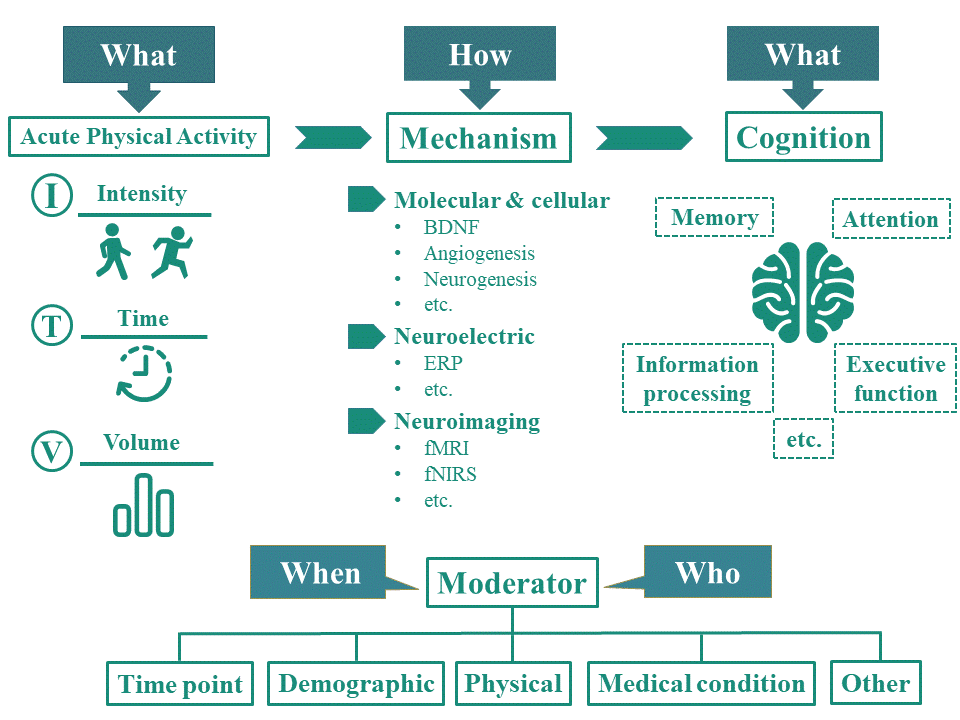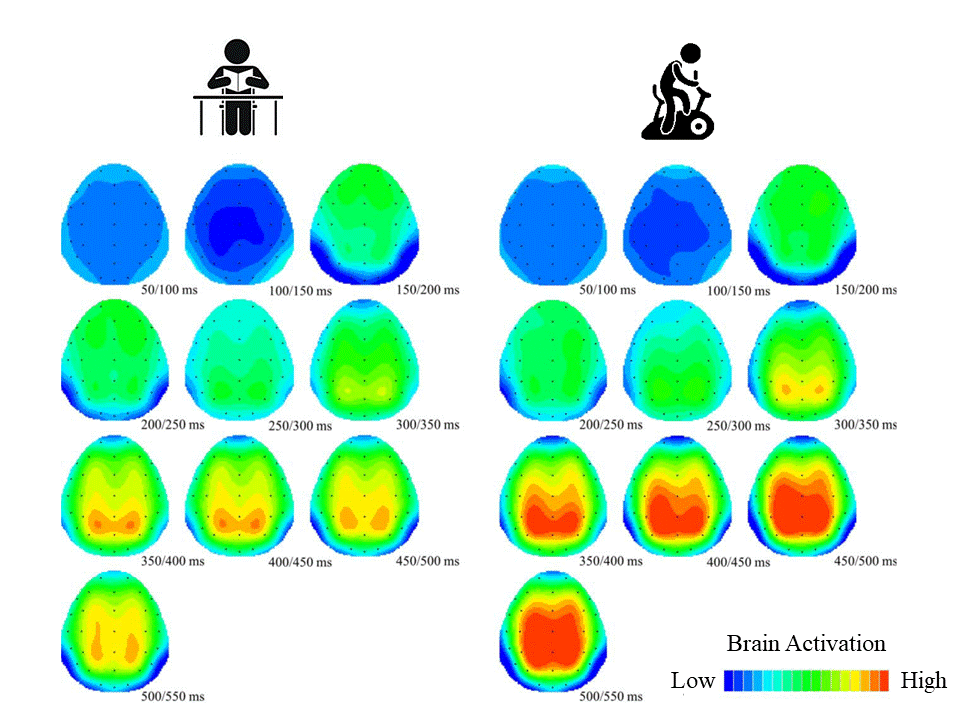Regular exercise is an important means of promoting physical and mental health, but the benefits don’t stop there. Recent studies have shown that the benefits of exercise can extend to the brain’s cognitive function! Research Chair Professor Yu-Kai Chang at the National Taiwan Normal University has actively conducted a series of investigations into exercise and the brain’s cognitive function, innovatively incorporating the cross-field integration of cognitive neuroscience to achieve evidence of brain health and a "exercise prescription.” The scientific evidence obtained in Taiwan is now being presented to the international community.
In order to reduce the difficulty associated with regular exercise, Prof. Chang’s research team explored and developed a simpler form of exercise from the perspective of neuro-electrophysiology, analyzing the possible operation of acute exercise on the cognitive functioning of the brain. The research model proposes specific directions for international researchers conducting follow-up studies, assisting them in broadening the influence of acute exercise on academics, industry, and society, and allowing individuals to exercise more effectively, positively affecting their hearts, brains, and lives.
In 2019, Scientific American published an article entitled "Humans Evolved to Exercise," which highlighted the importance of exercise to humans. A large number of scientific studies on public health and sports have suggested that regular exercise can reduce all-cause mortality and the risk of heart disease, stroke, cancer at multiple sites, Type 2 diabetes, and osteoporosis, as well as increasing aerobic capacity, muscle strength, and muscle endurance. Not only that, exercise is known to reduce negative psychological characteristics such as stress, anxiety, and worry, as well as improving positive mental states such as optimism and happiness. However, the latest research has shown that the benefits of exercise can extend to our cognitive function, and even to our brain health!
Exercise and the cognitive functioning of the brain
Cognitive function is an important component of mental health. The reason is that its origin is in the brain, so it is also called "brain cognitive function." It refers to the mental capacity of people to process information or apply knowledge. For example, attention, memory, learning, planning, reasoning, and even problem solving, decision-making and judgment are all subordinate to them. Given that these cognitive functions of the brain play an important role in daily life, how to enhance and strengthen them has become an important issue of academic concern. Unexpectedly, exercises that seem to be oriented toward "body muscles" may enhance cognitive functions of the brain toward this "mental" side! In fact, from the perspective of meta-analysis, Professor Jennifer Etnier at the University of North Carolina in the United States proposed in 1997 that there was a significant positive connection between exercise and cognitive function, a conclusion that marked the beginning of international research on this topic.
Research Chair Professor Yu-Kai Chang at the National Taiwan Normal University studied under Professor Etnier as her first doctoral student at the University of North Carolina. During his studies, Professor Chang was very interested in the topic of exercise and cognitive function. Later, he carried out a series of studies on the topic, innovatively including cognitive neuroscience in the hopes of achieving "brain science" through cross-field integration and developing an "exercise prescription" based on the evidence of "brain strength."
A new type of brain exercise: Scientific evidence from Taiwan
During this study, Professor Chang’s team found that although regular exercise could strengthen the brain’s cognitive function, it was not easy for the public to commit to long-term participation. Therefore, it was important to find other, simpler forms of exercise. Fortunately, Professor Chang's research team conducted an integrated analysis, determining in 2012 that a single exercise (called “acute exercise” in science) could improve cognitive function. Specifically, regardless of the particulars, a single bout of exercise could significantly increase cognitive function. This study identified a new form of exercise for people who don’t have time to dedicate to exercise. The study was published in Brain Research and has been cited thousands of times by the international community. It has also been included in the authoritative "Physical Activity Guidelines from the Advisory Committee’s Scientific Report" published by the US government, as well as the "US National Physical Activity Guidelines" published in 2018.
After the "US National Physical Activity Guidelines" first proposed that acute exercise could promote cognitive function, Professor Chang’s research team also developed a research model on the future direction of this topic, which was published in the top journal in sports science, Sports Medicine, in 2019 (see Figure 1).

Figure 1: Chang’s research team proposed a research model for acute exercise and brain cognitive function, as well as specific directions for follow-up research for international researchers.
Professor Chang’s team first explored the possible mechanisms of multiple event-related potential components (a special form of brain potential measurement index) and brain neurotrophic serum factors, publishing their work in Psychophysiology in 2017. The results showed that a single exercise not only had a holistic effect on different cognitive tasks, but also induced a larger P3 and smaller N450 amplitude compared to the control situation. This result means that a single moderate-intensity exercise can improve a variety of cognitive functions, and the benefit may be related to increased brain attention or nerve resource allocation, as well as the process of conflict detection reflected by endogenous nerve potential components such as P3 and N 450 (see Figure 2).

Figure 2: The research team found that, compared to the control situation, acute exercise could induce greater brain activation, meaning that the benefits of acute moderate-intensity exercise may be related to increased brain attention, nerve resource allocation, and conflict detection. Modified from Psychophysiology
Another aspect of future research is to move towards a more efficient single exercise prescription, such as, which acute exercise is the most effective in terms of intensity, time or total amount? What kind of brain cognitive function benefits the most from acute exercise? Does acute exercise need to be changed for individuals with different physical conditions and characteristics? The core of these questions points to the need for future research to design optimized and personalized exercise prescriptions based on personal perspectives. Such investigations will not only enhance the cross-domain knowledge of sports science and brain cognitive neuroscience, but more importantly, propose a scientific basis that can be practically applied to industry, and broaden the greater influence of exercise in society through the combination of academia and industry.
Optimize life through exercise and change both the mind and brain
Einstein once said: "Life is like riding a bicycle. If you want to maintain balance, you must keep exercising." The research team led by Professor Chang will make us all better through their cross-field exploration of exercise and brain neuroscience. Exercise for your "mind, brain, and life!"
Reference
- Chang, Y. K., Labban, J. D., Gapin, J. I., & Etnier, J. L. (2012). The effects of acute exercise on cognitive performance: A meta-analysis. Brain Research, 1453, 87-101.
- Chang, Y. K., Alderman, B. L., Chu, C. H., Wang, C. C., Song, T. F., & Chen, F. T. (2017). Acute exercise has a general facilitative effect on cognitive function: A combined ERP temporal dynamics and BDNF study. Psychophysiology, 54, 289-300.
- Chang, Y. K., Erickson, K. I., Stamatakis, E., & Hung, T. M. (2019). How the 2018 US physical activity guidelines are a call to promote and better understand acute physical activity for cognitive function gains. Sports Medicine, 49, 1625-1627.












